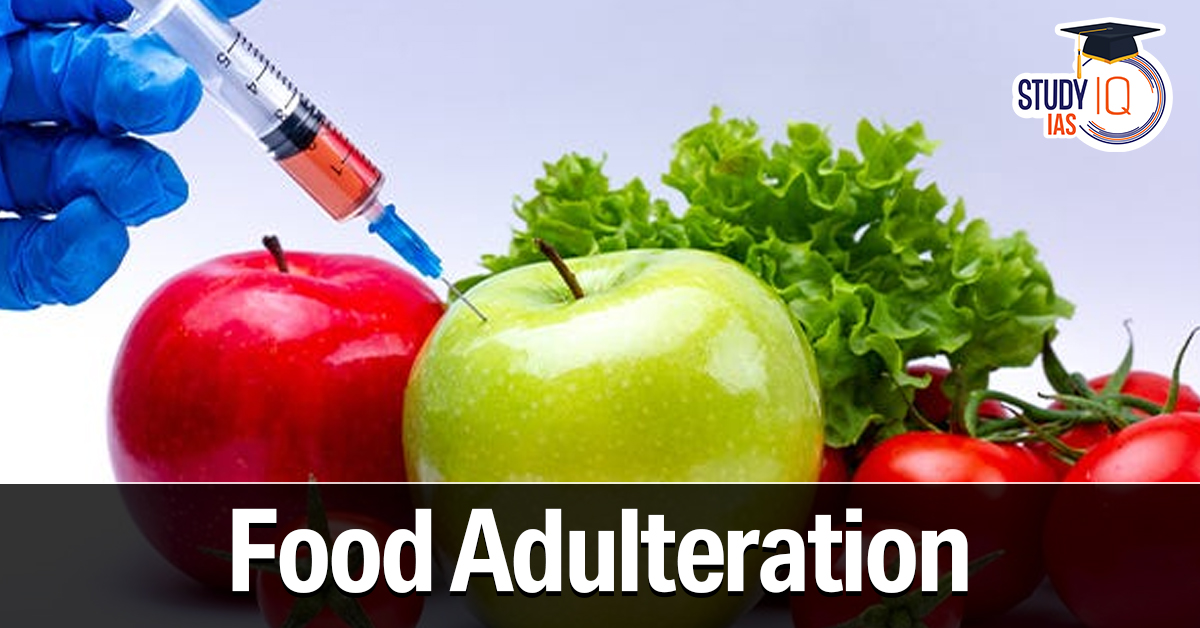Table of Contents
Context: The prevalence of adulterated food should set alarm bells ringing in a country
What is Meant by Food Adulteration?
Food adulteration refers to the intentional or unintentional contamination of food by adding, mixing, or substituting harmful or inferior substances called adulterants.
| Status of Health Crisis in India (National Family Health Survey (NFHS-5, 2019-21) | |
| Indicator | Data |
| Stunting in children under 5 | 35.5% |
| Wasting in children under 5 | 19.3% |
| Underweight prevalence | 32.1% |
| India’s diabetic population | ~77 million (adults over 18) |
Types of Food Adulteration in India
Milk and Dairy Products
- Common adulterants: Water, starch, detergent, synthetic milk, urea, caustic soda.
- Fake paneer: Made using starch, synthetic milk, and non-edible acids.
- Health risks: Gastrointestinal issues, kidney damage, metabolic disorders, and in extreme cases, cancer.
Edible Oils
- Common adulterants: Argemone oil (toxic), castor oil, mineral oil, rice bran oil.
- Health risks: Glaucoma, heart problems, dropsy (swelling due to fluid retention).
Spices and Condiments
- Common adulterants: Artificial colours, lead chromate (in turmeric), Sudan dye (in chilli powder), brick dust.
- Health risks: Liver damage, cancer (due to carcinogenic dyes), anaemia.
Vegetables and Fruits
- Common adulterants: Malachite green (leafy veggies), wax coating (apples), calcium carbide (ripening), oxytocin (to enhance size).
- Health risks: Hormonal imbalance, neurological disorders, and cancer.
Grains and Pulses
- Common adulterants: Polishing with artificial colours, mixing of stones, and chalk powder.
- Health risks: Digestive disorders, kidney issues.
Beverages and Packaged Foods
- Common adulterants: Artificial sweeteners, colours, preservatives beyond limits.
- Health risks: Obesity, diabetes, cancer, allergic reactions.
Recent Incidents of Food Adulteration in India
- MDH and Everest Spices Banned (2024)
- Fake Paneer in Delhi, Noida, Mumbai (2023–2024)
- Adulterated Watermelons (2024)
| Facts |
|
Health Risks Associated with Food Adulteration
| Adulterant | Health Risks |
| Detergents (in milk/paneer) | Gastrointestinal issues, diarrhoea, and toxicity |
| Synthetic milk | Liver and kidney damage |
| Argemone oil (in mustard oil) | Epidemic dropsy (swelling, glaucoma, even death) |
| Ethylene oxide (in spices) | Cancer (Group 1 carcinogen), reproductive issues |
| Artificial colorings | Hyperactivity in children, skin allergies, and cancer |
| Starch/glucose in milk/paneer | Increases sugar levels, harmful for diabetics |
| Acetic acid (in fake paneer) | Stomach ulcers, mucosal damage |
What Needs to Be Done
- Stricter FSSAI enforcement and surprise inspections.
- Public awareness campaigns on food adulteration.
- Food literacy initiatives teach people how to detect and avoid adulterated foods.
- Improved supply chain monitoring—from farming to packaging.
- Updated permissible limits for pesticides and contaminants in food.


 SEBI’s SWAGAT-FI Framework for Low-Ris...
SEBI’s SWAGAT-FI Framework for Low-Ris...
 Out-of-Pocket Health Expenditure, Reason...
Out-of-Pocket Health Expenditure, Reason...
 Treasury Bills (T-bills): RBI Cuts Holdi...
Treasury Bills (T-bills): RBI Cuts Holdi...




















